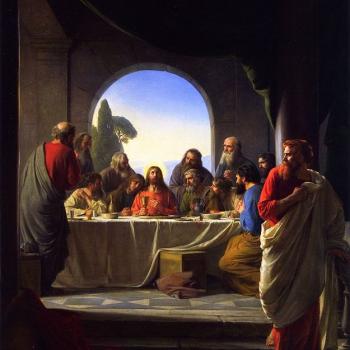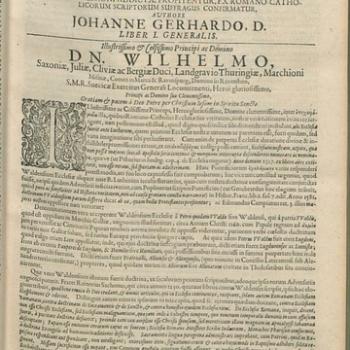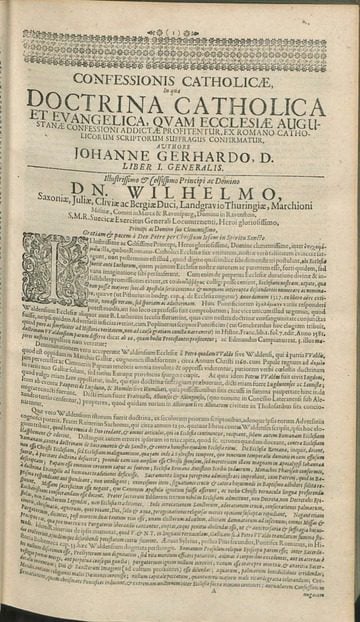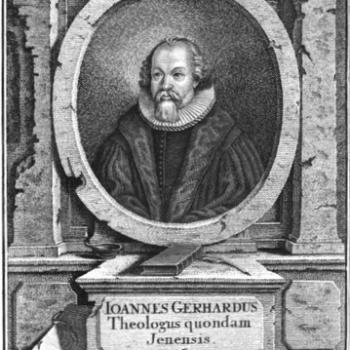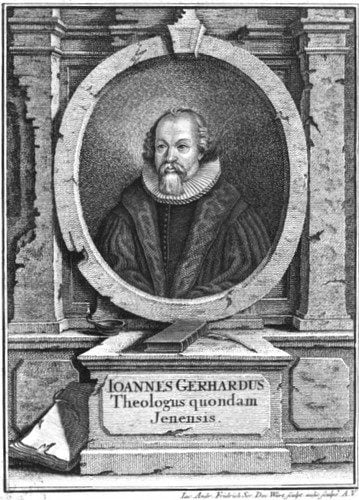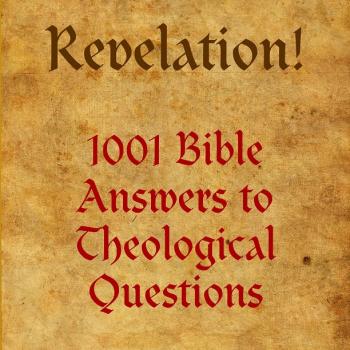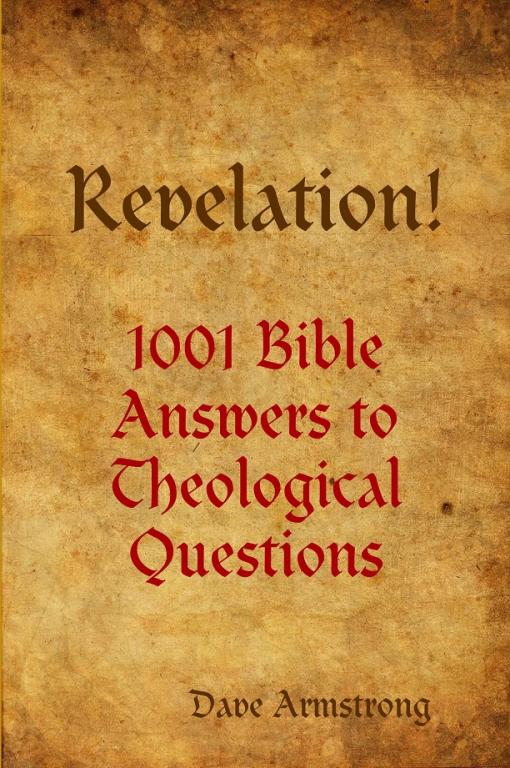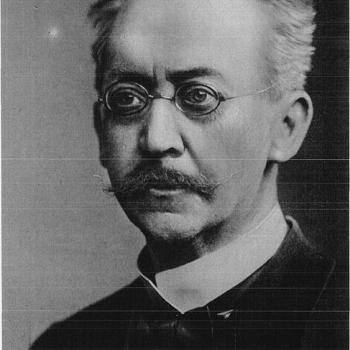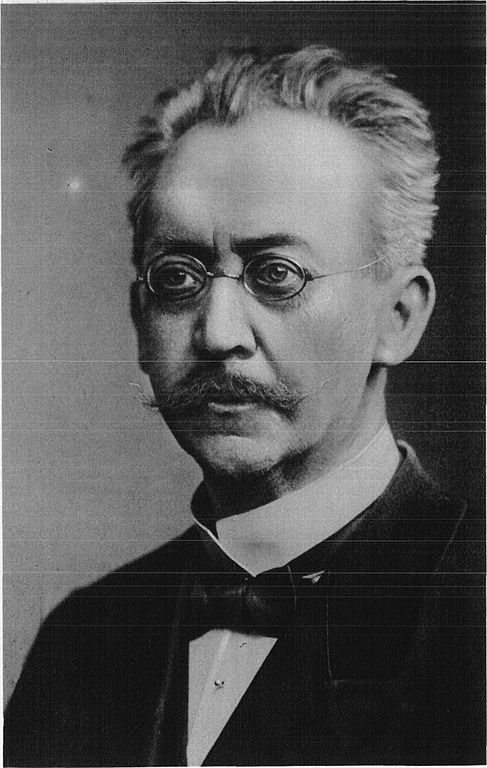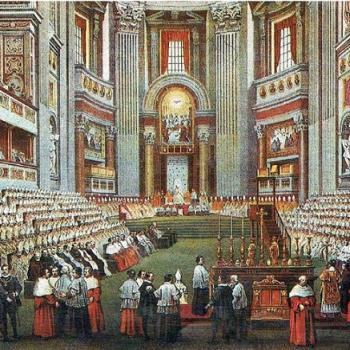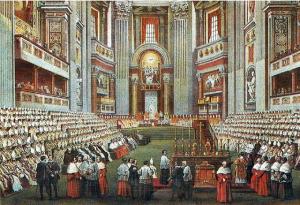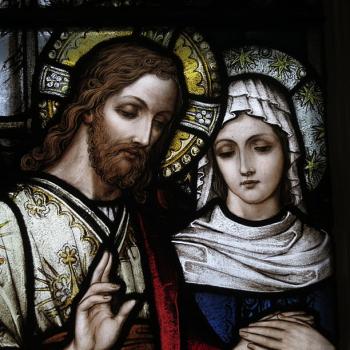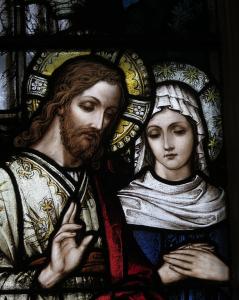Does a traditional literal reading of “this is my body” entail “a thousand absurdities and contradictions”? The book of Job is instructive
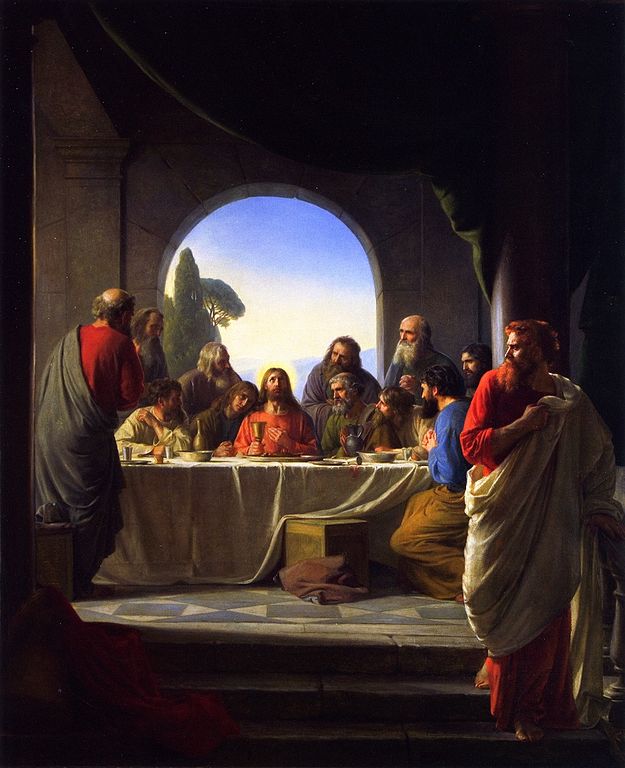
Vs. Turretin #11: Eucharist, Pt. 1
François Turretin (1623-1687) was a Genevan-Italian Reformed scholastic theologian and renowned defender of the Calvinistic (Reformed) orthodoxy represented by the Synod of Dort, and was one of the authors of the Helvetic Consensus (1675). He is generally considered to be the best Calvinist apologist besides John Calvin himself. His Institutes of Elenctic Theology (three volumes, Geneva, 1679–1685) used the scholastic method. “Elenctic” means “refuting an argument by proving the falsehood of its conclusion.” Turretin contended against the conflicting Christian perspectives of Catholicism and Arminianism. It was a popular textbook; notably at Princeton Theological Seminary, until it was replaced by Charles Hodge‘s Systematic Theology in the late 19th century. Turretin also greatly influenced the Puritans.
This is a reply to portions of a section of Institutes of Elenctic Theology (Vol. 3, 19th Topic: The Sacraments / 26th Question: The Meaning of the Sacramental Words). I utilize the edition translated by George Musgrave Giger and edited by James T. Dennison, Jr. (Presbyterian and Reformed Publishing Company, Phillipsburg, New Jersey: 1992 / 1994 / 1997; 2320 pages). It uses the KJV for Bible verses. I will use RSV unless otherwise indicated. All installments of this series of replies can be found on my Calvinism & General Protestantism web page, under the category, “Replies to Francois Turretin (1632-1687).” Turretin’s words will be in blue.
*****
Are the words of the Supper to be understood properly and literally . . . or figuratively and sacramentally? The former we deny; the latter we affirm against the Romanists and Lutherans. [italicized in the original]
This is the debate in a nutshell. Does one take the words at face value (literally) or hold that they are metaphorical and symbolic only? The Church fathers, the medieval theologians, Catholicism, Orthodoxy, Lutheranism, and at least some “high” Anglicans take them literally, making this by far the majority position in historical and current Christianity.
The body of Christ reclined at the table in the first Supper, so therefore it could not have been handed to the disciples; rather the bread which was set before them on the table was handed to them. . . .
The disciples . . . could not have given to these words any other sense than the tropical. (1) They saw at the same time the body of the Lord reclining at the table and the bread which he took, as things separated from each other, both as to nature and as to place, so that they must have conceived the most diverse ideas concerning them. . . .
The sixth class is drawn from the rules of discourse, which in this argument do not allow a proper sense, but necessarily demand a figurative. The first is: “When a literal interpretation involves an absurdity and a contradiction, we must necessarily have recourse to the figurative sense.” Since the human intellect cannot comprehend how a thing can be and not be at the same time, it is forced to recur to a figure. Now it is evident that the sacramental words, taken properly and literally . . . involve a thousand absurdities and contradictions . . .
None of this is successful argumentation, because 1) it limits God in His omniscience and omnipotence, and 2) it’s unbiblical. Broadly speaking, God is everywhere and simultaneously can be said to be “in” certain things. God becoming a man in the incarnation is the most amazing manifestation of His taking on physical properties (God the Father and God the Holy Spirit being immaterial spirits). For example, the Bible asserts the equation of God (in some very real sense) with the pillars of cloud and of fire:
Exodus 13:21 And the LORD went before them by day in a pillar of cloud to lead them along the way, and by night in a pillar of fire . . .
Exodus 14:24 And in the morning watch the LORD in the pillar of fire and of cloud looked down upon the host of the Egyptians . . .
Exodus 33:9 When Moses entered the tent, the pillar of cloud would descend and stand at the door of the tent, and the LORD would speak with Moses.
Numbers 12:5 And the LORD came down in a pillar of cloud, and stood at the door of the tent, and called Aaron and Miriam . . .
Numbers 14:14 . . . thou goest before them, in a pillar of cloud by day and in a pillar of fire by night.
Deuteronomy 31:15 And the LORD appeared in the tent in a pillar of cloud . . .
Psalm 99:7 He spoke to them in the pillar of cloud . . .
Lest Turretin counter that this is merely symbolic, too, I submit this passage:
Exodus 33:10 And when all the people saw the pillar of cloud standing at the door of the tent, all the people would rise up and worship, every man at his tent door.
Only God can be worshiped; hence God truly was in the cloud. If He wasn’t, this act would have been rank idolatry (worship of mere matter). But the inspired text gives no indication whatsoever that it was improper. Likewise, God was in the burning bush in a very special way:
Exodus 3:4-6, 16 . . . God called to him out of the bush, “Moses, Moses!” And he said, “Here am I.” [5] Then he said, “Do not come near; put off your shoes from your feet, for the place on which you are standing is holy ground.” [6] And he said, “I am the God of your father, the God of Abraham, the God of Isaac, and the God of Jacob.” And Moses hid his face, for he was afraid to look at God. . . . [16] “Go and gather the elders of Israel together, and say to them, ‘The LORD, the God of your fathers, the God of Abraham, of Isaac, and of Jacob, has appeared to me’ . . . “
God was also specially present in the tabernacle and temple, in the Holy of Holies, and specifically between the cherubim on top of the ark of the covenant. Yet we are to believe that Jesus (Who is God) can’t will to enter — and actually enter — into what was formerly bread and wine and become substantially, bodily present in a miraculous way? To deny this is mere rationalistic special pleading, that lacks faith in God and belief in His omnipotent power.
If God could enter into a cloud or a fire, or in the holiest spaces in the ark, tabernacle, and temple, then He can do this by the same token, and the literal reading of the text is the fulfillment of it. Turretin put rationalistic philosophy in a higher place in this instance of his reasoning, than the Christian faith, and specifically faith in the supernatural.
Jesus was sovereign over the laws of nature and nature (matter) itself. He calmed a violent storm at sea (Mt 8:24-27). After His resurrection (when He had a body), Jesus passed through walls (Jn 20:19, 26). He raised the dead and in fact raised Himself (Jn 2:19-21; 10:17-18) because He had “the power which enables him even to subject all things to himself” (Phil 3:21) and because “in him all things hold together” (Col 1:17; Heb 1:3). He was omnipotent. Even some of Jesus’ followers had rather extraordinary and unusual miraculous gifts. Philip bilocated:
Acts 8:39-30 . . . the Spirit of the Lord caught up Philip; and the eunuch saw him no more, and went on his way rejoicing. [40] But Philip was found at Azo’tus, . . .
Philip was in Gaza with the Ethiopian eunuch when he was “caught up”. Then he appeared in Azotus, which is modern-day Ashdod: some 27 kilometers or about 17 miles from the northernmost point of Gaza. So a created human being could do that, by God’s power (and the prophet Elijah could stop rain for 3 1/2 years: Jas 5:16-18), but Jesus, Who is the omnipotent God, supposedly cannot do whatever amazing thing He desires to do? Such a notion is ludicrous and thoroughly anti-biblical. Turretin might deny that the ascended Jesus was omnipresent, but this is untrue as well:
Matthew 18:20 “For where two or three are gathered in my name, there am I in the midst of them.”
Matthew 28:20 “. . . lo, I am with you always, to the close of the age.”
Ephesians 1:22-23 . . . the church, [23] which is his body, the fulness of him who fills all in all.
Colossians 3:11 . . . Christ is all, and in all.
Note that the Matthew 18 passage records Jesus’ words before He was resurrected or ascended, and He was already speaking in the present tense of an extraordinary trait akin to or consistent with omnipresence. Therefore, He certainly could have been sacramentally present in the former bread and wine even at the Last Supper, and this interpretation is at least as plausible as the merely symbolic one. If the objection is that He can be present spiritually or immaterially, but not physically, we reply that Paul equated the Church (an actual thing) with Jesus’ “body” in Ephesians 1:22-23 above.
Moreover, the risen, ascended, and glorified Jesus told the just-about-to-be-converted Paul, “I am Jesus, whom you are persecuting” (Acts 9:5; cf. 22:7-8; 26:14-15). But the New Testament elsewhere — including his own words — states that Paul persecuted “the church” (Acts 8:1-3; 22:4; 26:9-11), which Paul later agreed was Jesus Himself (1 Tim 1:13). If Jesus, then, can equate Himself — including physically — with the “body of Christ”: the Church (and Paul follows suit), then by the same token, He can equate Himself with what was bread and wine; and He does so not only at the Last Supper, but repeatedly in John 6. St. Paul is every bit as literal as Jesus, since he wrote, “Whoever, therefore, eats the bread or drinks the cup of the Lord in an unworthy manner will be guilty of profaning the body and blood of the Lord” (1 Cor 11:27).
He took bread from the table, blessed, broke and gave it to his disciples. He did and said nothing of this about his own body.
Really?:
Matthew 26:26 Now as they were eating, Jesus took bread, and blessed, and broke it, and gave it to the disciples and said, “Take, eat; this is my body.” (cf. Mk 14:22; Lk 22:19; 1 Cor 11:24)
They had often heard the Lord speaking figuratively (who had accustomed them by the frequency of his parables to this mode of speaking), which could be understood only tropically and by analogy (as in Mt. 13 and elsewhere).
Again, this no more has to be interpreted non-literally, than the pillars of cloud and fire and the burning bush do. They were literally outward physical manifestations of the presence of God (clouds are material and are composed of water); therefore, by analogy, the accidents or appearance of bread and wine can do the same thing. Granted, this takes things even further into the supernatural realm, but this is the omnipotent God, Who can do anything that is possible to do.
The time in which they lived, the business about which they were engaged, was mystical and full of various figures. For in the sacrament of the Passover, which Christ was celebrating, this tropical locution was constantly occurring.
That’s a very poor and unfortunate example for Turretin to use in his argument, since Jesus was literally the Passover lamb (Jn 1:29, 36; Acts 8:32; 1 Cor 5:7: “Christ, our paschal lamb, has been sacrificed”; 1 Pet 1:19; Rev 5:6, 12; 12:11; many other NT usages of “lamb” referring to Jesus). Passover lambs were real lambs with real blood, and Jesus’ crucifixion and shedding of blood on our behalf (Rom 3:25; 5:9; Eph 1:7; 2:13; Heb 9:14; 10:19; 1 Pet 1:19; 1 Jn 1:7; Rev 1:5) were quite real and sacrificial and sufficient to save the entire human race.
Nay, unless this had come into their minds that the bread was figuratively called a body, how could they have helped being disturbed by a thing so monstrous? They, who in the least difficulties were perplexed, who dispute among themselves how Christ was about to go to the Father; and moved the question how he would go out of the world; who understood nothing of what he had said concerning his heavenly Father, how could they have been so ready to believe what all reason repudiates—that Christ was reclining at the table in their sight and that he was invisibly included under the bread?
They didn’t have to fully understand; at this point they were not yet indwelt with the Holy Spirit, as all Christian believers are. But they were called to accept His mysterious word because He was God and had proven that He was to them over and over with signs and various teachings. What they needed to do, therefore, was to believe in faith. This is precisely what they did do as described in John 6, after other “disciples” objected to Jesus’ “hard saying” that they claimed no one could “listen” to (Jn 6:60) and “did not believe” (6:64), with the result being that they “drew back and no longer went about with him” (6:66) because He taught the Real Presence. But St. Peter, still faithful, said:
John 6:68-69 . . . “Lord, to whom shall we go? You have the words of eternal life; [69] and we have believed, and have come to know, that you are the Holy One of God.”
They did what Job did in the face of utter mystery and confusion: they believed God — though confused and perplexed — because He was God. God drives home this point over and over in that book:
Job 9:3, 8-12 If one wished to contend with him, one could not answer him once in a thousand times. . . . [8] who alone stretched out the heavens, and trampled the waves of the sea; [9] who made the Bear and Orion, the Plei’ades and the chambers of the south; [10] who does great things beyond understanding, and marvelous things without number. [11] Lo, he passes by me, and I see him not; he moves on, but I do not perceive him. [12] Behold, he snatches away; who can hinder him? Who will say to him, ‘What doest thou’?
Job 38:1-2, 4-5 Then the LORD answered Job out of the whirlwind: [2] “Who is this that darkens counsel by words without knowledge? . . . [4] “Where were you when I laid the foundation of the earth? Tell me, if you have understanding. [5] Who determined its measurements — surely you know! Or who stretched the line upon it?
Job 38:31-33 “Can you bind the chains of the Plei’ades, or loose the cords of Orion? [32] Can you lead forth the Maz’zaroth in their season, or can you guide the Bear with its children? [33] Do you know the ordinances of the heavens? Can you establish their rule on the earth?
Job 40:1-2 And the LORD said to Job: [2] “Shall a faultfinder contend with the Almighty? He who argues with God, let him answer it.”
Job 42:1-3, 6 Then Job answered the LORD: [2] “I know that thou canst do all things, and that no purpose of thine can be thwarted. [3] ‘Who is this that hides counsel without knowledge?’ Therefore I have uttered what I did not understand, things too wonderful for me, which I did not know. . . . [6] therefore I despise myself, and repent in dust and ashes.”
I wrote in my cover story in Patrick Madrid’s Envoy Magazine, Jan/Feb 2000 issue, entitled, “Is This God?”:
The Eucharist was intended by God as a different kind of miracle from the outset, requiring more profound faith, as opposed to the “proof” of tangible, empirical miracles. But in this it was certainly not unique among Christian doctrines and traditional beliefs – many fully shared by our Protestant brethren. The Virgin Birth, for example, cannot be observed or proven, and is the utter opposite of a demonstrable miracle, yet it is indeed a miracle of the most extraordinary sort.
Likewise, in the Atonement of Jesus the world sees a wretch of a beaten and tortured man being put to death on a cross. The Christian, on the other hand, sees there the great miracle of Redemption and the means of the salvation of mankind – an unspeakably sublime miracle, yet who but those with the eyes of faith can see or believe it? In fact, the disciples (with the possible exception of St. John, the only one present) didn’t even know what was happening at the time. . . .
Many Christian beliefs require a great deal of faith, even relatively “blind” faith. Protestants manage to believe in a number of such doctrines (such as the Trinity, God’s eternal existence, omnipotence, angels, the power of prayer, instantaneous justification, the Second Coming, etc.). Why should the Real Presence be singled out for excessive skepticism and unchecked rationalism? . . .
This pervasive anti-eucharistic bias smacks of an analogy to the Jewish and Muslim belief that the Incarnation as an unthinkable (impossible?) task for God to undertake. They view the Incarnation in the same way as the majority of Protestants regard the Eucharist. For them God wouldn’t or couldn’t or shouldn’t become a man. For evangelicals God wouldn’t or couldn’t or shouldn’t become substantially, sacramentally present under the outward forms of bread and wine. I think the dynamic is the same. “Coulda woulda shoulda” theology is not biblical theology. Every Christian exercises faith in things which are very difficult to grasp with the natural mind, because they are revealed to be true by God in the Bible. I have attempted to show why I think Protestants inconsistently require a higher criterion of “proof” where the Holy Eucharist is concerned.
Turretin, following Calvin and Zwingli, wants to play the role of the unbelieving and rebellious disciples and of Job’s miserable “comforters.” He finds it too difficult to believe that God could or would become bodily present in what was bread and wine. That unbelief and denial of the supernatural and God’s omnipotence and the plain words of Jesus (however incomprehensible they may have been at first hearing) are, I respectfully submit, the things that are truly “monstrous” and what bring about “a thousand absurdities and contradictions.”
*
***
*
Photo credit: The Last Supper, by Carl Bloch (1834-1890) [public domain / Wikimedia Commons]
Summary: Renowned Calvinist theologian François Turretin contended that Jesus’ words “This is my body” must necessarily be figuratively interpreted. But I show why this miserably fails.


